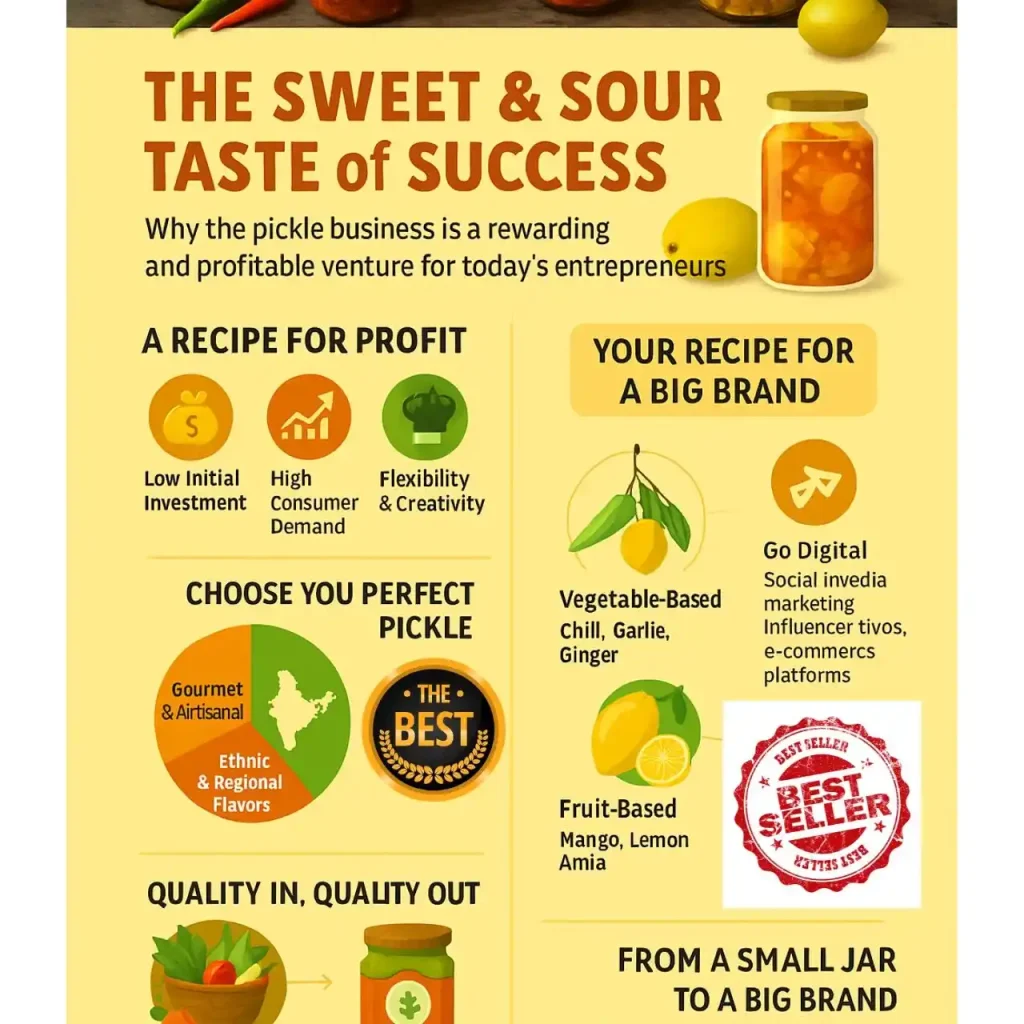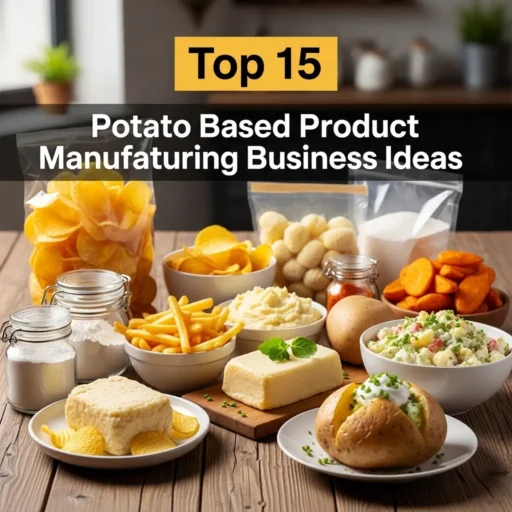Besides culture and taste, pickles have added something precious to the pages of conservation as an essential culinary offering at homes worldwide.
For all this time, making pickles has been converted into an activity beyond just past time among households. The process expanded over the years to include the business aspect, both in-house or outside shores.
Starting up a pickle production business is quite motivational because people’s interests keep revolving toward traditional foods with handmade items, hence making it very profitable. An entrepreneur can choose from homemade artisanal goods through to big-time production.
This is interesting since cheap, cheap raw materials are easily available from the nearest community, and this has unlimited possibility in terms of brand name or product types. Pickle Manufacturing Industry is a trend now.
Pickle Manufacturing Industry is a trend now.
Market Potential and Trends
Associated with increasing interest among consumers for unique flavors with health as well as authenticity, sales of pickles are on an upward trend. The traditional pickle is the one put just within the rural household and exported across those health-anxious consumers and the diasporas.
Interest has hit the roof in this segment for organic, natural ingredients. Even the smaller players can compete easily with the giant manufacturers because they talk the flavo,uored hand-crafted recipes and localized dramas.
Gourmet foods are gaining increasing acceptance, furthering a redesigned repertoire of traditional pickles available for retailers, restaurants, or online consumers.
Provenance: What kind of Pickles Can You Make?
That a wide variety of products can be found in the pickle industry is among its most impressive selling points. A pickle entrepreneur can choose to specialize in fruit-based pickles, vegetable-based pickles, or mixed pickles.
Some of the favorites are mango, lemon, garlic, chili, and ginger pickles, while the mixed vegetable pickles are for those who enjoy more complex flavors. Growing demand also includes new pickles with reduced sodium, no sugar, or no oil to satisfy health-conscious customers.
How to Setup Own Pickle Manufacturing Business?
Setting Up Your Own Pickle Manufacturing Business?
These specialties will fall in their variety and appeal to these niche consumers, like South Indian pickles or Punjabi pickles. With many flavors, sizes, and types on offer, the businesses can have specializations for each particular segment.
Setup Your Business
The establishment of a pickle business demands a well-organized plan well in advance that will observe the entire criterion of food safety. The first step is to hence identify what model that entrepreneur intended to pursue: small-scale production at home, artisanal plant, or a commercial factory.
Usually, in the scope of home-based operation, the investment usually accounts for a small amount towards purchase of utensils, storage jars, and equipment.
For large-scale operations, machines such as the blender, sealer, and vegetable cutter are essential. Also, to build consumer confidence, registration of the venture and obtaining required food safety certificates, hygiene practices, etc., is a must. A proper production area with good storage is, of course, necessary to maintain product quality as well as shelf-life.
Read Our Book: Click Here
Sourcing Ingredients and Packaging
A perfect pickle business relies on the quality of raw material. These fresh vegetables, fruits, and spices need to be sourced from reliable sources. To raise up the proper ante for your brand, you can use organic raw materials.
Packaging is equally important does not only protect the product but also promotes it. Based on the market segment one is targeting, the best option would be to use glass jars or PET containers. Customers trusting the brand would like to know ingredients, nutritional information, and manufacture details.
Packaging, on the other hand, goes further in enhancing the visibility of your brand both on your store shelves and online.
Production Processes and Quality Control
Pickling comprises washing as well as chopping vegetables and fruits; making paste or blends of spices; use of salt or vinegar to preserve the prepared items; and keeping them in airtight containers. The modernized process is assisted by machinery and quality control practices to ensure consistency and safety.
Traditional methods used include sun-dried and fermented. Cleanliness is maintained throughout the entire production to avoid contamination that could lead to damage or spoilage. pH, moisture moderation, and microbial counts should be determined over regular intervals at a time.
Application of SOP and continuing education keep those factors which will always keep the company on the radar far into the future.
Related Article: Top 10 Most Profitable Business Ideas in Food Processing Industry with Rising Opportunities.
Marketing and Branding Strategies
Branding is that which makes the theme of small business fame. Companies can market their USPs, such as family recipes, organic offerings, or handcrafted production, through branding.
Such strong brand recognition, memorable storytelling logo, and attractive packaging would make an emotional connection between co-founders and also consumers. Social media campaigns, food festivals, and partnerships with influencers can promote the pickles to younger urban audiences.
Once you have traction on quality production, there are ways to start exportation. Scale Up and Diversify Your Business.

Scaling up and diversifying your business
As the pickle industry gains momentum, investing in automated equipment will make scaling production easier. We can do it by building partnerships with distributors and suppliers. Pickled spreads, relishes and sauces are a great way to diversify your product line. They appeal to a wide range of tastes.
Subscription boxes and gift hampers can be necessary to attract customers. Customized packaging for special occasions, as well as customized packaging, is also a good way to get premium clients. Collaboration with catering and restaurant companies can create new channels of sales.
Maintaining product consistency and establishing a reliable supply network are key to success at scale. Businesses that invest in R&D often keep up with their competitors by experimenting on flavors and ingredients.
Read Our Project Report: Click Here
Financial Considerations
The low barrier to entry is one of the main reasons why the pickle business appeals to newcomers. Raw materials and kitchen equipment are the only investments to start a pickle business at home.
Entrepreneurs can use their profits as they grow to purchase better equipment, rent larger facilities and expand distribution networks. Pricing strategies must balance affordability and perceived value. Multiple price points such as bulk family packs and small trial packs attract a larger audience.
Cost optimization, inventory management and bulk purchasing of ingredients can help to maintain profitability. Also ensure that products are always available.
Find the Best Idea for Yourself With our Startup Selector Tool
Conclusion
Pickle’s work is a lucrative society that mixes culinary traditions and business creativity. Cucumbers are popular accessories for global cuisine. Due to growing demand for organic foods, craft foods and ethnic flavors.
Often answered questions (FAQ)
Q1. How much money is needed to establish a domestic company?
All are required by glasses, raw materials and basic tools. Investments in a small manufacturing unit may be higher depending on the requirements for machine and packaging.
Q2. What certification do you need to sell cucumbers in a commercial environment?
Businesses must register for local food safety authorities and obtain certifications such as FSSAI (India) or equivalent in other countries. Proper standards and marketing hygiene are mandatory.
Q3. How can you sell cucumber?
Cucumbers can be sold online. Electronic trading platforms allow a wide range of reach. If you want to appeal to online shoppers, you need to have attractive packages, a clear product description and a brand effort.
Q4. How many times can cucumber last?
Cucumbers, when they are stored and prepared correctly, can take several months for more than a year. It is important to carry out regular quality checks to ensure cucumber safety.
Q5. What are the features of standout cucumbers?
Unique flavors, traditional recipes, organic ingredients and engaging packaging help the brand to differentiate themselves from competitors and attract loyal customers.







